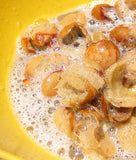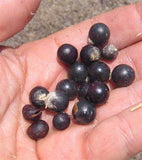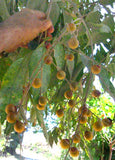Sapindus saponaria, commonly called the western soapberry tree, is a deciduous perennial plant in the soapberry tree family, Sapindaceae. S. saponaria has a wide native distribution across the western and the midwestern United States. When grown in clumps, the thickets rise to about 20 feet tall. When singular, the trees are known to reach heights of 50 feet tall. S. saponaria leaves are alternately organized up the stem with a lanceolate pinnate compound shape. The epidermis of the leaves are leathery and bright green measuring 8 to 15 inches in length and 1 to 2 inches wide. Sapindus saponaria blooms in the fall with large white cone shaped inflorescences. The tree is monoecious but has each type of flower on the same plant, it is recommended to cross pollinate for higher yield. The golden ball shaped fruit ripen in the spring time and are known to contain up to 37% of saponin, which can be used to make soap or wetting agents. Sapindus saponaria can tolerate a variety of soil types including rocky and sandy soils, but it prefers well-draining soils with a neutral to slightly acidic pH. The tree grows best in full sun to partial shade but can tolerate some amounts of shade. It is drought tolerant but should be watered regularly until established. Once established it is known to be able to live off of rainfall. USDA plant hardiness zone 7a to 11b.
Sapindus saponaria seeds require light scarification with fine grit sandpaper and a 24 hour warm water bath before being sown. After soaking, plant the seeds about an inch deep in a well draining high organic potting mixture. Germinating pots should be kept indoors, out of extreme light and heat. Ideal germination temperatures range from 70°F to 80°F. Germination typically takes 3 to 8 weeks to occur. Even with optimal conditions, germination may be slow and sporadic.
INTERNATIONAL SHIPPING DISCLAIMER:
All packages will be shipped with basic customs information such as; HS codes, VAT numbers, and properly labeled contents. Unfortunately, The Garden of Set is unable to provide phytosanitary certificates for orders at this time. It is the buyer’s responsibility to know local laws regarding the import of plants, seeds, and plant products into their country. It is also up to the buyer to provide any other customs forms or information required to import plants into their country. If packages get stopped by customs, The Garden of Set will not be able to provide a refund for the purchase. Most of the time packages make it to their destinations just fine, this is for the small minority of packages that get stopped without having all the proper customs information required by the country of import. Purchase at your own discretion.






